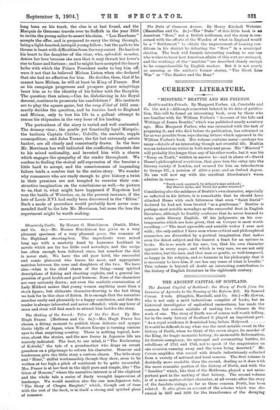" MINSTREL " BEATTIE AND HIS FRIENDS.
Beattie and his Friends. By Margaret Forbes. (A. Constable and Co. 15s. net.)—Although somewhat belated in its date of publica- tion, this will be found an interesting book, even by those who are familiar with Sir William Forbes's "Account of the Life and Writings of James Beattie," which was published nearly a century ago. Miss Margaret Forbes, who was entrusted with the task of preparing it, and who died before its publication, has refrained as far as was possible from reproducing letters which appeared in Sir William Forbes's book. Her volume contains many—perhaps too many—details of an interesting though not eventful life. Beattie was an industrious writer in both verse and prose. His " Minstrel " will probably live longer than any of his other works. but it was his "Essay on Truth," written in answer to—and in abuse of—David Hume's philosophical scepticism, that gave him the entry into the literary society of London, and secured for him an introduction to George III., a pension of £200 a year, and an Oxford degree. No One will now say with the excellent Aberdonian's warm admirer in verse- " Truth sunk oppress'd, by Atheist's rage subdued; But Beattie spoke, and Truth her power renewed."
Considering also the mildness of Beattie's own character, especially as reflected in his letters, it is remarkable that he should have attacked Hume with such bitterness that even "Saint David'" declared he had not been treated "as a gentleman." Beattie is perhaps most notable nowadays as the successful Scot in English literature, although he frankly confesses that he never learned to write quite literary English. Of his judgments on his con- temporaries which are here given, that on Cowper is most worth recalling :—" The most agreeable and amiable writer I ever met with ; the only author I have seen whose critical and philosophical researches are diversified by a poetical imagination that makes even the driest subject and the leanest a feast for an epicure in books. He is so much at his ease, too, that his own character appears in every page ; and which is very rare, we see not only the writer, but the man, and that man so gentle, so well-tempered, so happy in his religion, and so humane in his philosophy that it is necessary to love him, if one has any sense of what is lovable." This volume is beyond all doubt an interesting contribution to the history of English literature in the eighteenth century.






































 Previous page
Previous page